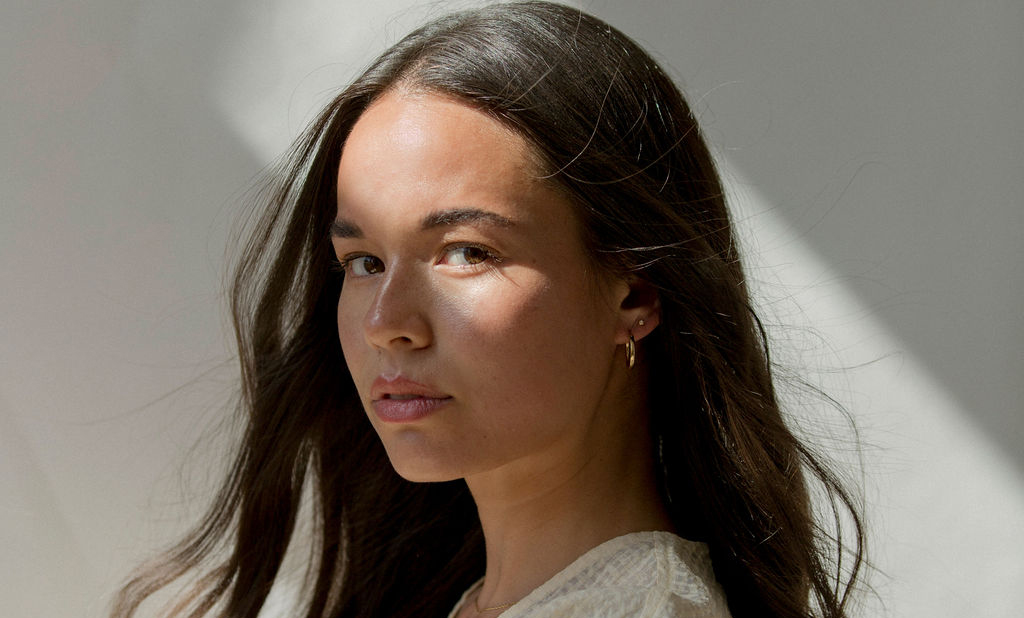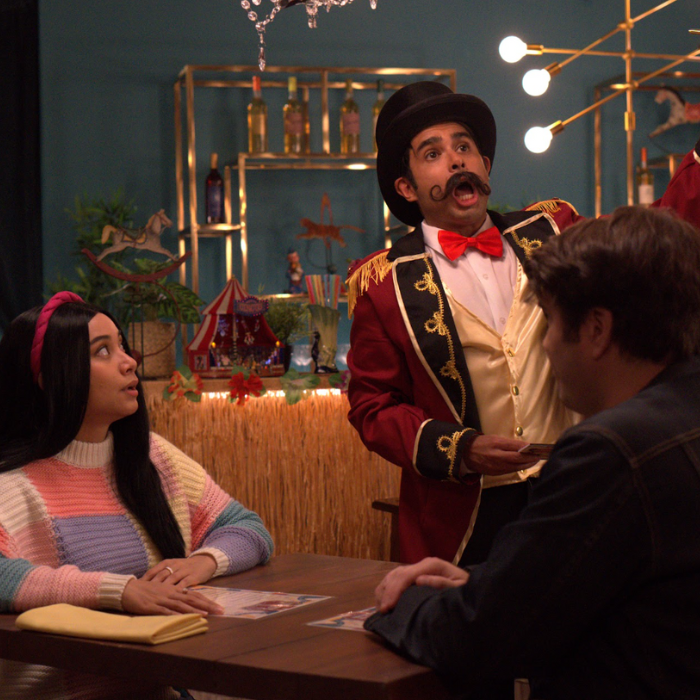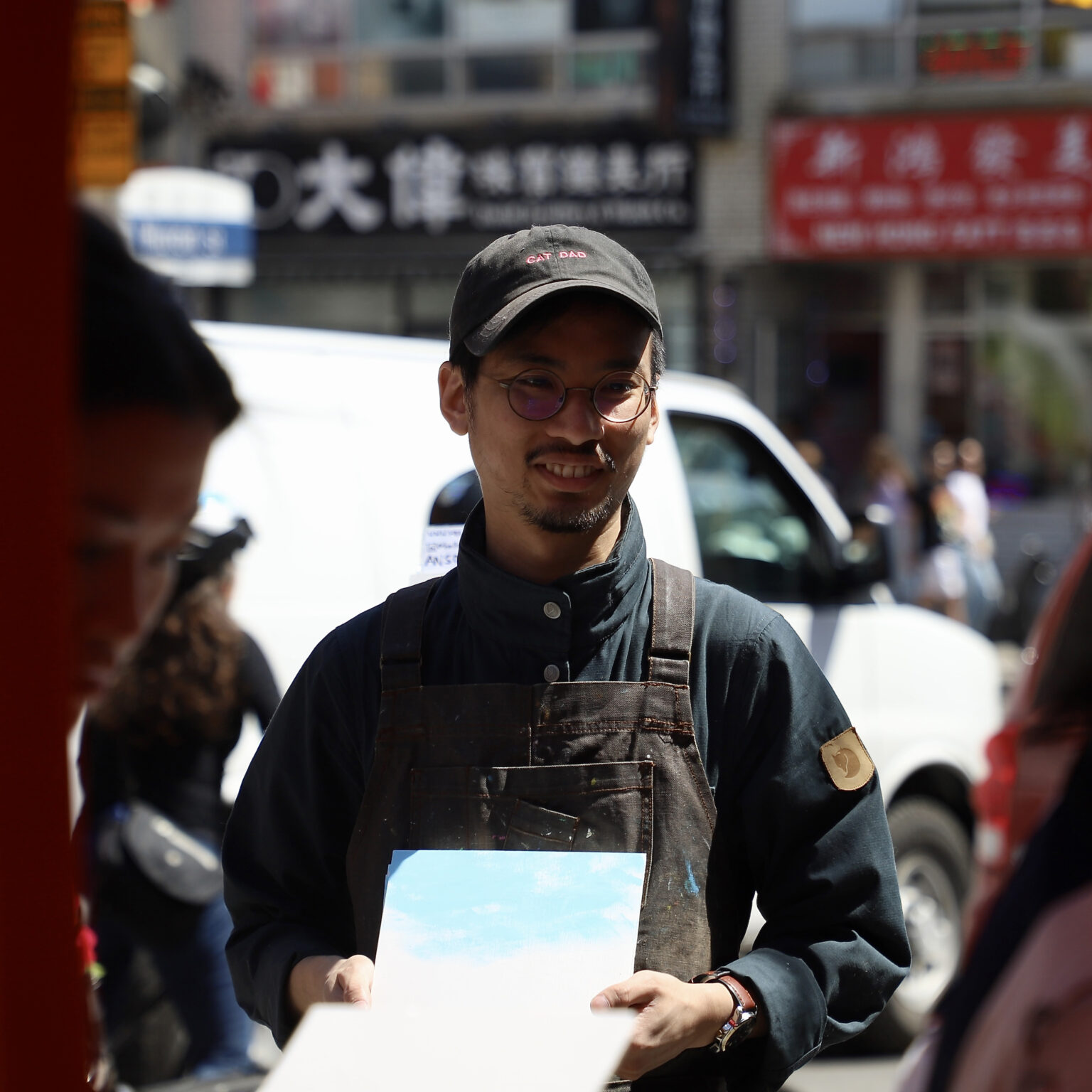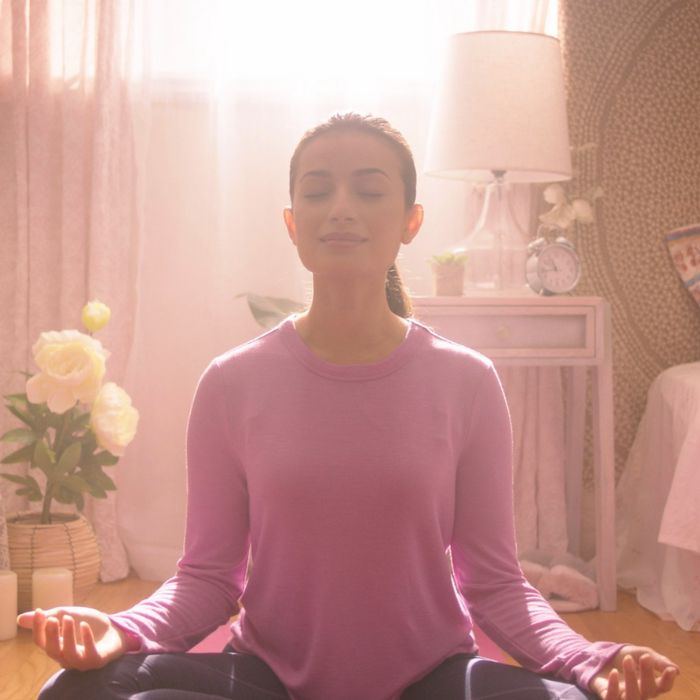Genevieve Kang has an incredibly warm presence to her.
When I hop on a video call with Canadian actress, I immediately feel a sense of ease and comfort, almost as if I am chatting with an old friend. She appears naturally poised, but I can tell she’s also not afraid to be goofy and let loose. It’s incredibly endearing.
Kang is one of the stars of the Netflix series, Locke & Key, which is based on the beloved horror comic from Joe Hill. She plays Jackie Veda, the moral compass of the story who serves as a guidepost particularly to Tyler Locke’s character. She also appeared in Run This Town opposite Ben Platt and Damian Lewis and had a recurring role in Freeform’s Shadowhunters.
Kang’s journey to acting has been, as she describes it, a “long road.” Though the B.C.-native got her first agent at age 15, she took a break from the industry to explore different career paths, including communications and holistic nutrition. But one day, she woke up with a gut feeling that she needed to pursue acting full-time again. And once she made that decision, she started booking more roles.
“The universe kind of had my back there,” she laughs.
Though she has found success, Kang’s acting career hasn’t come without challenges. As a mixed race actress of Chinese and Portuguese descent, Kang says she’s had difficulty with castings—either because she’s considered “too Asian” or “too white.”
“The biggest challenge has been that I don’t really fit anywhere,” she explains. “They don’t know where to place me.”
She also has made it a point to only choose roles or projects where she feels the characters are properly represented—a tough choice for any actor hoping to get work.
“It comes down to an integrity thing,” she says. “I want to tell stories that are more authentically representing individuals and that are going to push the narrative. I’m so tired of seeing the same stories over and over again.”
Read on for my conversation with Genevieve Kang, where she discusses more about the challenges she’s faced being mixed race, her thoughts on the current state of representation in media, and the legacy she hopes to leave for other women of colour.

REPRESENTASIAN PROJECT: Let’s start from the beginning of how did you get into acting and what made you wanna get into it?
GENEVIEVE KANG: Similar to a lot of performers, at a very young age I was putting on shows for my family at home. I always loved performing, however, I grew up in a very academic household and academics and sports were kind of the main focus of our family. And my parents didn’t really know where to place me in terms of theatre or dance or any of that.
When I was 14, I did my first play [in high school] and I just fell in love with the whole process of working with others and collaborating. I was just lit up by it. And shortly after that I convinced my mom to let me get an agent (laughs).
RP: Oh my gosh, how old were you?
GK: I was 15, I think?
RP: Wow, and she got one for you?
GK: Yeah, I mean, again, it was at a point where all my siblings had sports that they really excelled at growing up. And I participated in a lot of sports, but it just wasn’t my thing. And so I think once I showed a real interest in theatre and performing and they saw just how excited I was about it, they wanted to invest as much as they could in it for me, the same way they had supported my siblings in sports.
So, I got an agent and I was working in TV and film my last couple of years in high school. And then I moved to Toronto for my undergrad and I took some time off from working professionally as an actor and was just focusing on theatre school.
[My career]’s been a, a long road…I’ve technically been in the industry for like 15 years, in and out. It’s only been the last five years that I’ve been doing it full time. And part of that’s because it’s a really hard industry. But another part of it is it also took me a long time to convince myself that I could do this for a living, because again, growing up in a family that was very much like “go to school, get a job,” that kind of mentality, I kinda kept going to school: I did an undergrad theatre, a master’s in communications, and then I took a break and then I went back to school and became a nutritionist. So it was like I was constantly denying myself what I really wanted to do, just because it didn’t feel supported in my family. Then one day I just woke up and I was like, I gotta just do this for myself.

RP: What was that turning point where you were just like, “I’m just gonna go for it“?
GK: I was working as nutritionist and I literally just woke up one morning feeling so low emotionally and just like something was missing. I realized I just wasn’t being fulfilled creatively. I honestly just woke up with a gut feeling that I needed to make a change. And it was later that day that I started to take the steps towards saving up money so that I could leave behind working as a nutritionist and take the leap into just pursuing acting. And it was interesting because it felt like a total like energetic mind shift. Then all of a sudden, more auditions started rolling in and I just started booking consistently. It’s like the universe kind of had my back in that. And I just think I had so many life experiences in my twenties too, that now that I’m in the industry, I’m not as easy swayed so much. At a younger age, it would’ve been different experience, and I see that with a lot of young people in the TV and film industry.
RP: I think that’s a really great point that you touch on of being ‘older’ in the industry. You’re still young, obviously, but it’s not like you starred in a big Netflix show when you’re 16, for example. And I read an interview where you talked about how you have a responsibility as an actor to choose roles that really resonate with you or that you feel represent you or your community properly. Could you tell me more about that and how you’re able to have that self-assurance to say no to certain roles that maybe don’t fit with you?
GK: It comes from a place of really wanting to nourish the roots of like the change that I think we need to make just in the world in general, versus just a quick fix or bandaid-ing something really quickly and then thinking it will go away. I don’t want to see [stereotypes or tropes] for any kind of minority group. But as an actor, there’s so much out of my control, but the one thing I can do when auditioning for stuff is just not be a participant in the telling of [a stereotypical] story. I’m not someone who pushes my beliefs on other people, but I do try to lead by example. That’s kind of my way of influencing, I suppose. But for me, it’s just a gut thing…I just wouldn’t feel good participating in a story that is misrepresenting a particular individual or culture or group. And I try to speak about it with people in my industry because it seems like something that just kind of goes over people’s heads—like they don’t even think about it. [To them], it’s like, “Well, that’s the story that’s written, so I’m just going to do that part.”
“I want to tell stories that are more authentically representing certain individuals and are going to push the narrative.”
RP: Yeah, it’s tricky. What comes to mind for me is Kim’s Convenience and the controversy that occurred last year where it was revealed the writer’s room didn’t have a lot of minorities in it. But it seemed like a lot of the actors tried to push back, but it didn’t work because, as you said, there’s only so much an actor can do. But I do like what you said about how from the get-go you can kind of tell if it’s a really stereotypical character or a character that seems to have more depth to them, or more of a storyline than just being an accessory.
GK: Totally. And there have been roles I’ve turned down in recent years where minority groups, in my opinion, are being misrepresented. So in term of the self-assuredness that comes with making those decisions, because that’s a job opportunity for me, too, for me it comes down to an integrity thing. It’s just my value set of I want to tell stories that are more authentically representing certain individuals and are going to push the narrative. I’m so tired of seeing the same stories over and over again!
RP: What do you think of the state of representation in media right now? Not just for Asians, but as a whole?
GK: I think as an audience member I’ve had emotional experiences because I’m seeing someone on screen who I didn’t see when I was younger, so then I think about young people today getting to see themselves more represented. But we still have a really long way to go. It is exciting, and I am excited to be a small part of that moving forward, but I can see the industry getting lazy about it, and I think we have to actively continue to push that boundary forward.
“As an actor, there’s so much out of my control, but the one thing I can do when auditioning for stuff is just not be a participant in the telling of [a stereotypical] story. For me, it’s just a gut thing…I just wouldn’t feel good participating in a story that is misrepresenting a particular individual or culture or group.”
And speaking to your point earlier about the writer’s rooms—[representation of] people off screen, the creative team behind a project and seeing diversity there is really important. But again, I can see the industry getting lazy about it.
RP: What do you think it’s going to take to change that? For the industry not to be lazy anymore, not do things for show, or as you said before, put a bandaid on a problem as opposed to getting to the root of it?
GK: Wow, that’s a big question. I think us just talking about it is helping. Continuing those conversations may seem like such a small thing, but when I bring up some of my challenges as a mixed race actor and my feelings around the industry and diversity and representation to some of my Caucasian friends who are actors, it’s shocking how many of them just don’t get it, because they’re not experiencing it firsthand or they’re not aware of it because they don’t need to be.
I have a friend who’s working on a script and is thinking about who they’re going to cast in these roles. And [having these conversations] is kind of broadening their mind to think, “Oh, this doesn’t have to be a Caucasian character. This could be any ethnicity.” So it’s small things, but I think [things can change] over time, if we keep at these conversations and having this type of dialogue.
RP: That’s such a great answer. If we think on that Kim’s Convenience answer again, it was really important for them to bring those issues up, in terms of showing the industry that there are still changes that need to be made.
GK: Yeah, for sure.

RP: You touched on some of the challenges that you face as a mixed race actor, could you share some of those?
GK: Yeah, it’s so interesting, because when I started in the industry in my teens, I remember a number of people both in and out of the industry saying that because I’m mixed and therefore “ethnically ambiguous,” it was going to be so great for my career because I could play so many different ethnicities. So, in a lot of ways, it seemed like a pro in the early days. But then as time’s gone by, it’s actually served as somewhat of a challenge because now people don’t know where to place me. And now, where people are trying to cast things more authentically, there are very few roles that are mixed Asian, specifically Chinese and Portuguese.
When I get auditions from my team and they’re looking for someone to play the character of Japanese Canadian descent, for example, it really becomes a conversation every time where I have to sit down with my team and address whether it’s a role about a Japanese Canadian character specifically, or an Asian character. What is the story being told? And is it my story to tell? And that’s a big question I’ve had to ask myself a number of times because often cases it’s not, and I have to turn down certain auditions.
“The biggest challenge [as a mixed race actress] has been that I don’t really fit anywhere. For a lot of projects, I don’t fit what they’re looking for in an Asian role because I look white. And then for projects where they’re looking for someone more Caucasian, they think I look too ethnic for it. So sometimes it feels like I really am just looking for that perfect role where they’re literally looking for a Chinese Portuguese woman.”
And [in the audition] room, I am, without fail, always being asked what my background is. And people are shocked…some people are like “Oh, you’re Asian?” and others are like, “Oh, of course she’s Asian.” So it’s a subjective thing. But I’m also very much white passing which has been an interesting quality to have in the industry because in so many ways I am privileged over an individual whose parents are both Asian. But at the same time, I’ve also experienced my fair share of discrimination.
So the biggest challenge has been that I don’t really fit anywhere. For a lot of projects, I don’t fit what they’re looking for in an Asian role because I look white. And then for projects where they’re looking for someone more Caucasian, they think I look too ethnic for it. So sometimes it feels like I really am just looking for that perfect role where they’re literally looking for a Chinese Portuguese woman.
RP: I think it’s so interesting that you said they don’t know where to place you, or which ‘side’ of you to cast, because a lot of my friends who are mixed Asian and white, they feel not Asian enough on one side, but not white enough on the other side. Is this something you experience in your everyday life, too?
GK: Yes. (laughs). Growing up, my parents did at really good job of exposing us to both cultures. But if we’d go to a family gathering on my dad’s [Chinese] side, me and my siblings would stand out [among our Asian cousins]…and you just can’t help but feel like you’re different. And then on my mom’s side, which is Portuguese, we were the Asian kids.
So there is that feeling where you’re not really accepted by the Asian community and you’re not really accepted by the white community either. So you end up kind of finding other biracial people. But that’s something I had to come to terms with as I’ve gotten older—I’m not fully Caucasian, I’m not fully Asian, I’m a mix. And that’s just my own unique thing.

But it was interesting, after the Atlanta spa shootings, I found myself grieving, not just for the Asian community, but also because I had this realization where I was like, “Oh my gosh. I’ve rejected so much of that part of me.” And it really opened up a lot of stuff… and how I knew, at a very young age, how whiteness granted a certain privilege. I grew up in a very white community and I saw how my white friends, they just belonged. They were accepted. They were loved. So I remember wanting to lean into whiteness, and by doing so, I was very much not accepting my Asian heritage. And up until very recent years, I wasn’t actively denying it, but I wasn’t proud of it. But something really shifted for me recently.
RP: What was that shift?
GK: It was a combination things. I think part of it’s just getting older and watching my parents and having an appreciation for them. Or even just thinking about when they got together—I remember my mom sharing stories with us when we were younger about some of the challenges she and my dad faced being a mixed race couple. And now, I just have so much compassion and respect for what they’ve gone through.
And I mean, truthfully, it’s been a lot of internal work as well. I’ve gone to therapy for many years to address a lot of my own insecurity, especially the way I looked physically and not being reflected [on-screen].
RP: I really resonate with that, because I also grew up in a very white town. And I really rejected my own culture because I was like, well, no one here looks like me. I don’t see people in magazines or on TV who look like me. So I wanted to whitewash myself and just try to blend in as much as I could. But then, like you, as I got older, I became more appreciative of my parents. Even like, Chinese herbs! When they would give it to me as a kid, I hated it, but now I’m like, “Give me all the herbs!”
GK: (Laughs). One of my best friends is Chinese and she’s always joking about her mom harassing her to drink warm water and broth and all this stuff, and I’m just like, “Yeah, you should! It’s really good for you! I’ve been doing this now for months, and it’s such a difference!”
RP: It really does! Okay, my last question is, how do you hope to inspire other women of colour—whether Chinese, Portuguese or mixed—through your work?
GK: Oh wow. That’s a big question, but it’s great because I’m also thinking, “Well, why am I doing what I’m doing?” I’m working on a script of my own that’s very much based on growing up mixed. And I hope that in sharing my story, it inspires others to share theirs. Because that’s what I’ve really discovered in this past decade of my life—how much I was living my life for others and not accepting certain aspects. And I feel like I’m in a place now where I’m very much proud.
This interview has been edited for length and clarity.
Like this post? Follow The RepresentASIAN Project on Instagram, TikTok, Twitter, YouTube and Facebook to keep updated on the latest content.











